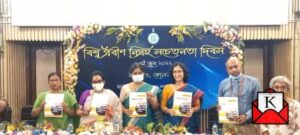National Report Bridge The Gap: Understanding Elder Needs Released


UN recognized ‘World Elder Abuse Awareness Day’ on 15th June. HelpAge India released its national report ‘Bridge the Gap: Understanding Elder Needs’. The report was released by the chief guest, Mrs (Dr) Shashi Panja, Minister In–Charge, Department of Women and Child Development &Social Welfare, Government of West Bengal at the Nandan Hall 3.
India has 138 million elderly people or about 10% of the country’s total population. The effects of COVID 19 on the elderly were unprecedented, and they forced governments, institutions, and society at large to alter how they view the elderly. Elderly people were found to be both the most at risk and the hardest hit during the pandemic. HelpAge has been studying the effects of the pandemic on the elderly for the past two years, with Covid 19 acting as the silent tormentor, but this year is significant from the perspective of the time-lapse post-pandemic devastation and seeing early signs of recovery.
As a result, the report considers all of the elderly’s experiences rather than just the fundamental existential problems they face on a daily basis. This report seeks to understand the major gaps that prevent the elderly from living happy, healthy, and productive lives, based on the UN Principles on the aging of self-fulfillment, participation, independence, dignity, and care.
Some of the findings of the report are:
- Elders today aspire to work because they want to be seen as contributing members of society rather than just as dependents. Therefore, it is crucial that they create an enabling environment for a significant portion of senior citizens who are willing and capable of contributing towards realizing the longevity dividend in addition to providing social protection for the poor and disadvantaged.
- Nationally 47% of elders are dependent on family for the source of income while34 % are dependent on pensions & cash transfers. Meanwhile, in Kolkata, 49% of the elderly are dependent on family, while 18% depend upon pensions and cash transfers.
- On the volunteering front, around 30% of the elderly are willing to volunteer and contribute to society.
- 87% of elders reported there is the availability of healthcare facilities nearby, however, 78% of elders mentioned unavailability of App-based/Online healthcare facilities, and a significant 67% of elderly reported, they do not have any health insurance at this critical stage in their lives and only 13% are covered under government insurance schemes.
- Nationally 59% of elders feel that elder abuse is prevalent in society, while only 10% of elders admitted to being a victim of elder abuse, with relatives (36%), Son (35%) & Daughters-in-law (21%) being the top 3 perpetrators. In Kolkata, 75% elderly feel that such abuse is prevalent in society while 12% were themselves, victims. Elders attribute the abuse to their sons (29%) and daughters-in-law (8%) as the biggest perpetrators of abuse.
The report revisits and challenges the widespread ageism in society. It highlights the aspirations of seniors, who want to lead fulfilling lives after retirement.
